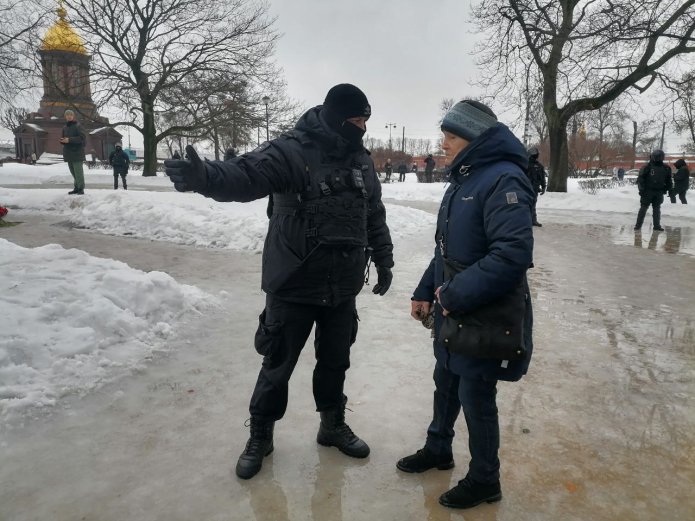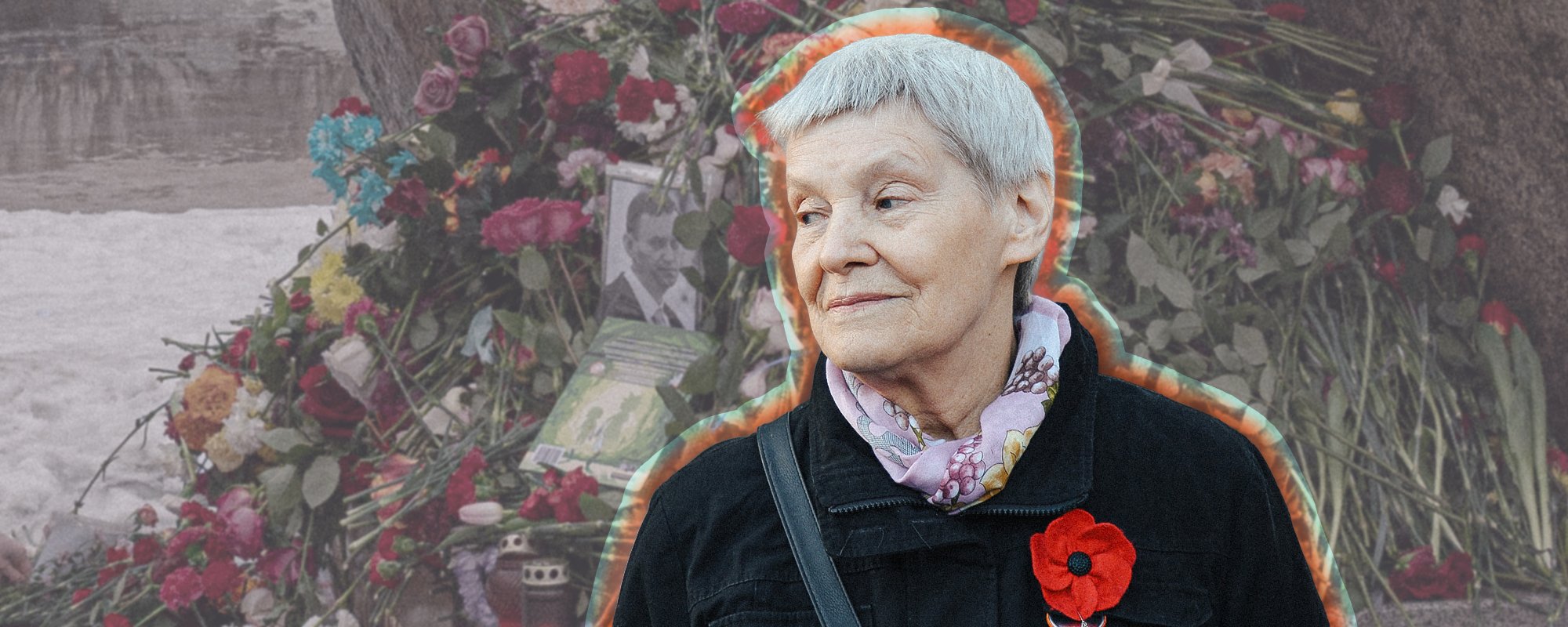A monologue from Valeriya Gnusareva, 83, a teacher, detained at the memorial service for Aleksei Navalny near the Solovetsky Stone in Saint Petersburg.
«You know, you won’t manage to trample on my soul»
I heard [of the murder of Aleksei Navalny] during the day on the 16th of February. I saw the news on the channel of [a journalist] Aleksandr Plyushchev. I was so upset that I couldn’t do anything as tears were choking me.
I do respect Navalny very much. I know a lot of people despised him. What sort of foul things were ever told of him! Is it jealousy? I don’t understand it. He is very important for my family, for me and my daughter. Once I heard a bad thing happened to him, I first thought he had been murdered or poisoned. He had a court hearing on the 15th and gave a speech there. Exactly like [Boris] Nemtsov who visited the Echo radio channel just before his death.
It was so unexpected, although, of course, he was imprisoned in horrible conditions and was treated badly. Those in power were dreaming of destroying him so that he did not interfere with what they did. Who can replace this man? I was just listening to Zhanna Nemtsova, who was also asking the same question: who can substitute Aleksei, who was always smiling, no matter how bitter his life was? «Hi, it’s Navalny!»
I have participated in protests and marches since the Perestroika time. Once I heard of Aleksei’s death, I understood that I will not stay at home. Then I had read that the priest Grigory Mikhnov-Vaitenko was going to conduct a memorial service. I had prepared a poster. When collecting scraps from journals, I found his photo, a smiling boy [Aleksei Navalny — OVD-Info]. I wrote, «He did not die. He was murdered».
Early in the morning on the 17th of February, I bought roses and went [to the Solovetsky Stone, a memorial of victims of political repressions]. My daughter was at work at this time. It was horribly slippery outside, so I was going very slowly, almost crawling.
I came there and saw policemen standing in the distance. As I am an experienced person already, I turned so that they would not see me with the poster. I also wear a badge reading «No war» on my bag. Everybody pays attention to it in the subway or a bus. Once a young guy in the subway ripped this badge off and began shaming me publicly asking what right I have to claim things like this. I attempted to pick it up but he pushed me aside and began trampling the badge. I said, «You know, you won’t manage to trample on my soul». Nice that nobody denounced me. I made a new badge and placed it back.
«Don’t touch me, I will go on my own»
There were many people [near the Solovetsky Stone] queuing and laying flowers, everything was fine. Policemen were standing in the distance, not approaching us. I suddenly noticed that they began surrounding us. There was a cute girl standing by me. Later I found out her name was Varya, and she was detained together with me. She was holding a poster reading «Don’t give up!» I neared the policemen and asked, «Why are you taking the girl with you?»
After a while, they approached me. I did not manage to run away. When a policeman led me, I asked him not to pull me over. There was water everywhere, up to ankle level, and it was slippery, but he was pulling me over puddles. I said to him, «Don’t touch me, I will go on my own, I won’t run away». When I am being arrested [Valeriya Andreyevna had been repeatedly detained at protests in Saint Petersburg — OVD-Info], I always ask them to not touch me, as I am squeamish about it.

There were nineteen of us sitting in this bus, in a small locked cabin. How beautiful these people were! There were artists, poets, writers, and cinema directors! I was in a team of such lovely people! A grandson of Arseny Roginsky [the chairman of the board of the Memorial Society] was detained together with me. He was perplexed, like a child. We had been sitting in a prison truck since 12:30 AM, for about an hour. After this, they took us to the police department. After coming there, we stood still for about an hour.
They took me and another woman born in 1950 out. We were immediately taken to a room where three women, young girls, came in. One was older, and two were very young. They started forcing us to undress in order to search us. I said that I would not do that: I would not allow them to undress and search me. I said that I had human dignity.
But the woman I was with stripped down to her T-shirt. She had laced home pants, and the lace could not be removed — so they cut it off. They left her in the pants, which were almost falling down. Can you imagine what a humiliation it is? I said: «Girls, how can you not be ashamed? I’m a teacher, I’ve had lessons with so many children, I’ve never seen such a thing!» I’ve worked as an elementary school teacher for 40 years, I have a teaching excellence award, it’s my favorite job, my students still come to me. «No, take off your clothes and that’s it». I said I won’t do it. You can kill me. «Then we’ll put you in a cell and you’ll sit there until the trial». Do it. And I’m not gonna let you roll my fingerprints.
They said: «If you don’t give up to us, those who are now in the paddy wagon will sit there until we search you». I feel sorry for them, of course, but I can’t go for it. After a while they let me go. Some officers came in, I don’t know their rank, and said that it shouldn’t be done. And they didn’t search anybody else. But they still took away everyone’s cell phones.
«We pray — for peace and freedom»
They started taking us into a room that looked like a gym for police officers. We sat there and waited. They called us in one by one to draw up a record. Then they’d take us back to the gym. It turned out that we were not allowed to see a lawyer. Food was not given to anyone at first either.
When I did get a lawyer, I was very grateful to her. She looked at the protocol, told me how to behave. [The police] told me that I had to have a trial. Then they made me sign a paper that I refused to be searched and to roll my fingerprints. My daughter came to pick me up and we started waiting for the protocol to be given to me. We waited, waited, and waited, but there was no protocol. When we asked how long to wait, we were told: «It was lost, we don’t know where it is». We were given nothing, I left without a protocol and now I don’t even know what status I’m in (the lawyer told OVD-Info that Valeria Andreevna was released without a protocol).
All this lasted until 9 PM. Then the police said they would put us in their car and take us home. We refused, we did not want that. They said, «We have an order». I wasn’t scared. But I was afraid for the young ones who had been at the station for the first time. When I came out of there, they were just being led behind an iron door and they started to take them to cells — boys, girls and men — and it was horrible, there was nothing to sleep on, the toilets in these cells were so horrible. Someone, apparently their friends, brought them ground pads. I felt so bitter. I don’t know how their trial went later, who had been kept and who had been released.
God bless our country. I am 83 years old. When I was three, my mother was declared an enemy of the people and repressed, taken from home pregnant in 1944. I never saw or heard from her again, she was declared an incommunicado. Shortly before that my father had returned from the Finnish War and was frostbitten. There were three of us children left. My sister was thirteen, my brother was ten. We caught lice, we were hungry and cold, and no one wanted us. I didn’t see anything nice, except Perestroika, when I breathed a little air. In those times, everything became different, and then it rolled back to the same place, even got worse.
I’m a Catholic. Today at our mass, people prayed for Aleksei [Navalny]. I am always afraid for our priests. I tell them: «Be careful, there are different types of people!» When I entered the church, our priests were so nice greeting me! I asked if I had done the right thing, and they said: «Yes. After all, the Lord said that people should be free, there should be peace. And we pray for peace and freedom. And definitely for political prisoners».
Recorded by Marina-Maya Govzman



